Inequality is a hotly debated topic these days, but what exactly does it entail? How is inequality manifested and how does it impact the various sectors of society and our very own communities? These were some of the key questions that the participants of this year’s Shaping Futures Academy addressed in their third module titled “Tackling Multidimensional Inequalities”.

The module was conducted online from 2 – 20 September. As the module’s title suggests, inequality is a complex problem that cannot be properly understood or tackled from one perspective or dimension only. That is why the module was organised around and used the Multidimensional Inequality Framework (MIF). Developed by a team of researchers and practitioners from LSE/ CASE, SOAS and Oxfam, the MIF offers a systematic approach to measuring and analysing inequality across key life areas that shape people’s well-being and quality of life, and for identifying causes and potential solutions. The three-week module comprised a mix of plenary contributions on different dimensions of inequality, break-out sessions and project work in which participants in small groups applied the MIF to their local contexts. Different dimensions touched upon included: drivers of inequality, such as dominant narratives, financialisation and climate change; sectors in which inequality is manifested, such as the formal and informal economy, health and education; and inequality’s entanglements with class, gender, disability and other aspects of intersectionality.
The module ended with participants presenting their analyses and policy solutions. They did so on a diversity of topics such as unequal access to quality education between rural and urban areas in West Africa, and ensuring access to sexual and reproductive health rights in conflict zones, such as Sudan and the Democratic Republic Congo. This was the first time this module on inequalities took place digitally, and – save for the occasional technical challenge – it ran smoothly. Participants much appreciated the module; it resonated with many and was directly relevant to their work. As one participant, Farah Kanbi, said: “I found the module comprehensive and holistic. It resonated with my work at Politics4Her, where we focus on gender inequalities through an intersectional lens. The module provided valuable insights into a wide range of critical topics, including power dynamics, gender and climate justice, disability inclusion, and economic and digital inequalities”.

Schreibe einen Kommentar